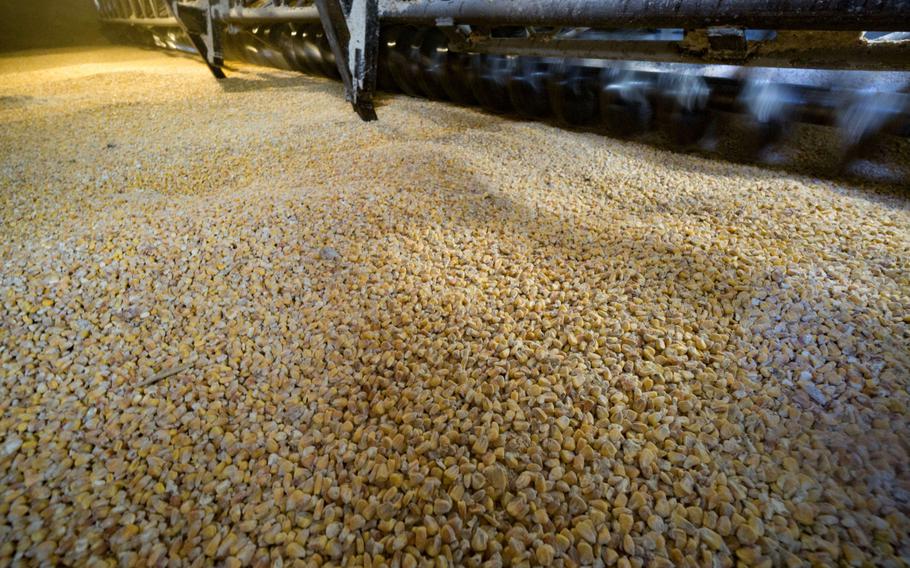
Corn grain sits inside a storage silo before being moved on a conveyor belt for loading onto a bulk carrier vessel at the Illichivsk Grain Terminal, operated by Glencore, at Illichivsk port in Odesa, Ukraine, on May 19, 2017. (Vincent Mundy/Bloomberg)
Ukraine is pushing for grain exports to continue from key ports following Russia's withdrawal from the Black Sea grain deal. Insurers and shippers aren't so sure.
Russia's termination of the pact this week means that it will no longer guarantee safe passage through the waterway. Ukraine is calling on other nations to help facilitate shipments from three of its deep-sea ports, which were covered by the agreement.
The United States said shipping escorts are not an option, and insurance broker Marsh on Tuesday suspended its program for grain exports from Ukraine, underscoring the challenges ahead.
"No sane owners will call there uninsured," said Vasilis Mouyis, joint managing director of Greece-based Doric Shipbrokers, which had previously had sent vessels through the shipping passage. Without the protection of the safe corridor, Mouyis said, "the Ukraine trade is dead."
Ukraine's Black Sea ports are a vital artery for its grain sales abroad - historically accounting for the bulk of shipments — and the harvest season is now underway. The deal helped clear the backlog sparked by the start of the war, but the corridor's closure could slow the next crop getting to market.
Russia's exit from the pact also takes place as Ukraine makes headway in its counteroffensive in the southern part of the country. Massive drone attacks were reported on Tuesday, following an attack on the main bridge linking Russia to Crimea. Moscow has warned that shipping hazards also remain.
"Attempts to continue the grain deal without the participation of the Russian Federation should take into account the risks associated with the fact that the grain-export route passes near the area of hostilities," said Kremlin spokesman Dmitry Peskov.
Ukraine has asked the United Nations and Turkey — which brokered the deal almost a year ago — whether they will continue to back it.
"The main task for Ukraine now is to get the support of Turkey," said Dmitry Skornyakov, chief executive officer of HarvEast Holding. He suggested that military escorts from Turkey could be used for ships entering and leaving Ukraine's ports.
That would be a highly risky move for Turkey, and the country is unlikely to get involved, according to an official familiar with the matter. Turkey wouldn't jeopardize its naval ships to assist vessels from Ukraine, and it is instead focused on restarting the deal with Russia's involvement.
Ukraine can still send crops via land and river, but those routes are more expensive, eating away farmers' incomes. Shipments via the European Union are also causing tensions with its neighbors.
The costs of exporting by sea are likely to climb, partly because of higher insurance and freight rates, said Roman Slaston, head of the Ukrainian Agribusiness Club. He remained optimistic shipments could happen but said it may take a few weeks to prepare.
When Russia briefly suspended its involvement in the deal in October, it issued warnings to vessels sailing the corridor. Some insurance coverage was suspended, and at least one ship bound for Odessa turned back.
"I don't think ship owners will go to the Ukrainian ports until the corridors are reestablished — it's not safe to do so," said Paul Markides, marine quality manager at Intercargo, a global trade association for dry-bulk shipowners.
Bloomberg's Megan Durisin, Lars Mucklejohn, Daryna Krasnolutska and Olesia Safronova contributed to this report.